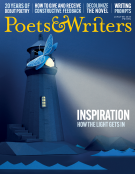Out there in the pure deep dark of the ocean is a small scrap of light dancing: Look how it twists and turns, drawing disappearing shapes against the water, raising the question of what it could be trying to say. You might wish to examine this wisp of light, to come closer to read its meaning—or perhaps you only wish to eat it, which is reasonable too. Either way, as soon as you’ve drawn near, the whole picture reveals itself: a mouth lined with long, variegated teeth just behind the light-tipped lure dangled from a fleshly stalk that hangs right in front of that mouth, a mouth from a nightmare that swallows you whole.
The lure of the anglerfish is its means of survival; it allows a body to continue to move forward into the dark unknown. It is also an adaptation to the extreme darkness of the deepwater ocean, where sun fails to penetrate and the only light you might see is the light that you create yourself. Every writer knows the feeling of being lost in the dark all alone, in this case the darkness of a pure white page waiting to be filled with shape and meaning, or perhaps the darkness of a page filled with words, none of which feel like the right ones, all of which feel like the aimless groping of a writer whose intention you can barely recognize.
It is easy in these moments to forget that illumination can come from within, at times when the world around you refuses to provide it. Go back to that draft and read it again with the hungry, searching eye of a predator: Where are the moments of levity, the glimpses of description that offer a bit of vivid color, the unexpected movement of a line that wriggles with life, that grabs your attention and holds it for a moment longer than the others? Seize that line, raise it to eye level, and interrogate it. What is it about this line that makes you want to grasp it? Is it the rhythm, the texture, the word choice? Is it the way it figures a character that you see clearly here as if for the first time, or does it raise a question about that character, one that leads off into the darkness of the not-yet-imagined?
If the line is captivating in its sound, cadence, sensuality, follow it with another, and another in the same mold—let it lead you into the voice of the piece. If the line raises a question, begin chasing that question to its end. You are moving into the dark spaces of the text, guided by a light that is given off by your own writing process. Let your light lead you into the wide-open maw of story, into the mystery of a narrative that has not yet been told. I am an invisible man. Mother died today. All this happened, more or less. These famous first lines lead the reader into the unknown, but it’s not hard to imagine that they once served as a guiding light for their writers, indicating where the mystery lies. Come closer, says the light, and see what else I have to offer.
Alexandra Kleeman is the author of the novel Something New Under the Sun (Hogarth, 2021); Intimations (Harper, 2016), a short story collection; and the novel You Too Can Have a Body Like Mine (Harper, 2015), which was awarded the 2016 Bard Fiction Prize and was a New York Times Editor’s Choice. In 2020 she was awarded the Rome Prize and the Berlin Prize, and she was awarded a Guggenheim Fellowship in Fiction in 2022.








